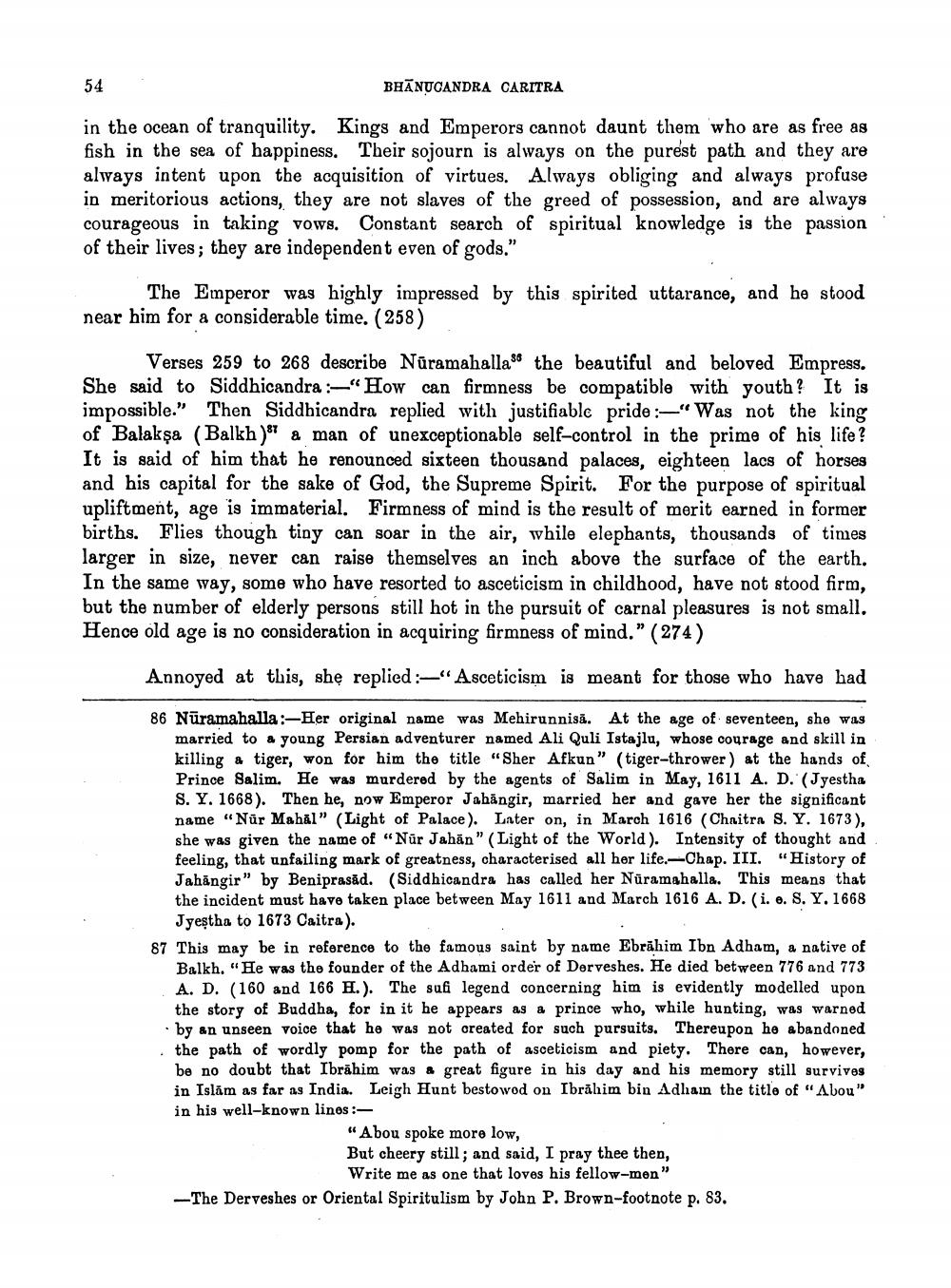________________
54
BHĀNUCANDRA CARITRA
in the ocean of tranquility. Kings and Emperors cannot daunt them who are as free as fish in the sea of happiness. Their sojourn is always on the purest path and they are always intent upon the acquisition of virtues. Always obliging and always profuse in meritorious actions, they are not slaves of the greed of possession, and are always courageous in taking vows. Constant search of spiritual knowledge is the passion of their lives; they are independent even of gods."
The Emperor was highly impressed by this spirited uttarance, and he stood near him for a considerable time. (258)
Verses 259 to 268 describe Nūramahallas the beautiful and beloved Empress. She said to Siddhicandra "How can firmness be compatible with youth? It is impossible.” Then Siddhicandra replied with justifiablc pride :-"Was not the king of Balakṣa (Balkh ) a man of unexceptionable self-control in the prime of his life? It is said of him that he renounced sixteen thousand palaces, eighteen lacs of horses and his capital for the sake of God, the Supreme Spirit. For the purpose of spiritual upliftment, age is immaterial. Firmness of mind is the result of merit earned in former births. Flies though tiny can soar in the air, while elephants, thousands of times larger in size, never can raise themselves an inch above the surface of the earth. In the same way, some who have resorted to asceticism in childhood, have not stood firm, but the number of elderly persons still hot in the pursuit of carnal pleasures is not small. Hence old age is no consideration in acquiring firmness of mind.” (274)
Annoyed at this, she replied :-"Asceticism is meant for those who have had
*
*
86 Nūramahalla :-Her original name was Mehirunnisā. At the age of seventeen, she was
married to a young Persian adventurer named Ali Quli Istajlu, whose courage and skill in killing & tiger, won for him the title "Sher Afkun" (tiger-thrower) at the hands of Prince Salim. He was murdered by the agents of Salim in May, 1611 A. D. (Jyestha S. Y. 1668). Then he, now Emperor Jahāngir, married her and gave her the significant name "Nür Mahal" (Light of Palace). Later on, in March 1616 (Chaitra S. Y. 1673), she was given the name of "Nür Jahān" (Light of the World). Intensity of thought and feeling, that unfailing mark of greatness, characterised all her life.-Chap. III. "History of Jahangir" by Beniprasād. (Siddhicandra has called her Nüramghall&. This means that the incident must have taken place between May 1611 and March 1616 A. D. (i. . S. Y. 1668
Jyestha to 1673 Caitra). 87 This may be in reference to the famous saint by name Ebrāhim Ibn Adham, a native of
Balkh. "He was the founder of the Adhami order of Derveshes. He died between 776 and 773 A. D. (160 and 166 H.). The sufi legend concerning him is evidently modelled upon the story of Buddha, for in it he appears as a prince who, while hunting, was warned by an unseen voice that he was not created for such pursuits. Thereupon he abandoned the path of wordly pomp for the path of asceticism and piety. There can, however, be no doubt that Ibrahim was a great figure in his day and his memory still survives in Islām as far as India. Leigh Hunt bestowod on Ibrāhim bin Adhain the title of "Abou" in his well-known lines :
"Abou spoke more low, But cheery still; and said, I pray thee then,
Write me as one that loves his fellow-men" -The Derveshes or Oriental Spiritulism by John P. Brown-footnote p. 83.




